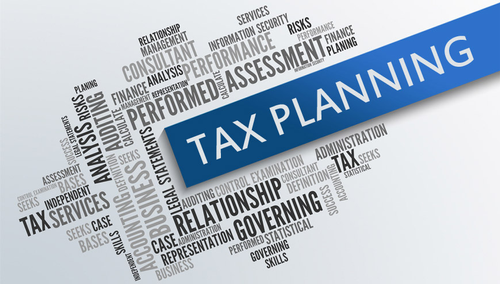Discover Professional Tax Planning is Essential for Long-Term Wealth Management
Discover Professional Tax Planning is Essential for Long-Term Wealth Management
Blog Article
Improve Your Riches Administration With Dedicated Tax Obligation Services for Estate Planning
In today's complex monetary landscape, enhancing your riches management approach through dedicated tax solutions for estate planning is not simply advantageous; it is essential. As people grapple with the ins and outs of possession circulation and tax ramifications, recognizing just how targeted tax strategies can secure and enhance the transfer of wealth comes to be vital. By discovering the intersection of tax obligation performance and estate preparation, one can reveal critical understandings that not only boost financial protection but additionally ensure a seamless tradition for future generations. What techniques might you be forgeting that could dramatically impact your estate's monetary health and wellness?
Relevance of Estate Preparation

A well-structured estate plan includes different elements, consisting of wills, trusts, and powers of lawyer. These instruments make certain that an individual's choices relating to property distribution, medical care choices, and guardianship of minors are clearly expressed and legitimately enforceable. Furthermore, estate preparation can promote the efficient transfer of properties, minimizing delays and potential probate expenses that might emerge without proper documentation.
Moreover, estate planning is critical in addressing possible tax effects on inherited properties, which can substantially impact the worth of an estate - Tax Planning. By proactively handling these factors to consider, individuals can guard their legacy and improve the financial wellness of their beneficiaries
Duty of Tax Solutions
Browsing the intricacies of tax obligation regulations is essential for people and companies alike, as tax obligation services play a crucial role in optimizing economic outcomes. These solutions provide expert assistance on tax obligation conformity, ensuring that customers adhere to ever-changing tax obligation laws while optimizing their monetary capacity.
Tax obligation professionals evaluate private and corporate financial scenarios to determine tax obligation liabilities and opportunities. They provide tailored strategies that line up with wider wealth management objectives, particularly in estate planning. By assessing various asset frameworks, tax services can recommend one of the most reliable methods to transfer wide range to successors, lessening prospective tax burdens connected with inheritance and inheritance tax.
Additionally, tax obligation services help in the prep work and filing of tax obligation returns, helping to prevent costly errors that could set off audits or fines. By integrating tax strategies right into total financial planning, clients can foster a much more durable economic future that aligns with their individual and estate planning objectives.
Methods for Minimizing Obligations

(Frost PLLC)An additional effective approach includes maximizing deductions and credits. Individuals ought to preserve organized records of insurance deductible expenditures, such as home loan passion, medical expenses, and philanthropic payments. Businesses can gain from determining qualified tax obligation credit histories, consisting of r & d credit reports, which can dramatically reduce tax concerns.
Furthermore, taking part in proactive tax planning is important. This includes timing earnings and costs purposefully; as an example, postponing earnings to future tax years or increasing deductions in the current year can produce desirable tax obligation implications. Making use of tax obligation loss harvesting in financial investment profiles can also alleviate capital gains tax obligations.
Making The Most Of Inheritance Worth
Taking full advantage of the value of an inheritance requires careful planning and critical decision-making. To make certain that successors obtain the complete benefit of their inheritance, it is vital to think about different elements that can influence its total worth. One important element is comprehending the tax implications related to the inheritance, consisting of inheritance tax and possible earnings taxes on acquired properties.
Using tax-efficient techniques can dramatically improve the inheritance worth. As an example, gifting assets throughout the benefactor's life time can minimize the taxed estate, thus permitting successors to inherit even more without incurring significant tax obligation liabilities. Furthermore, leveraging tax-deferred accounts, such as Individual retirement accounts or 401(k) s, can assist take full advantage of the growth possibility of the assets prior to circulation.
Moreover, beneficiaries should assess the timing of possession liquidation. Holding onto particular assets, such as property, might produce better long-term recognition compared to instant sale. On the other hand, selling off assets that are underperforming can stop possible losses.
(Food Industry Tax Services)
Teaming Up With Financial Advisors
Partnering with financial consultants can substantially improve the administration of acquired wealth, ensuring that beneficiaries make informed decisions that line up with their long-term monetary objectives - Tax Planning. Financial advisors bring proficiency in financial investment techniques, tax obligation ramifications, and estate planning, enabling successors to navigate intricate monetary landscapes with confidence
Effective collaboration begins with developing clear interaction between the monetary advisor and the beneficiaries. Understanding the family's worths, monetary goals, and risk tolerance is important in customizing a riches management technique that matches their special situation. Advisors can after that provide personalized recommendations that take advantage of tax-efficient investment lorries and estate planning methods, inevitably maximizing the worth of the inheritance.
In addition, normal conferences can help keep track of progress and make needed changes to the monetary strategy as circumstances advance. By promoting a positive relationship, heirs can remain educated concerning market patterns, tax legislation modifications, and relevant economic items that might benefit their portfolio.
Verdict
Including specialized tax obligation solutions into estate preparation dramatically improves riches administration by guaranteeing the efficient transfer of possessions and the reduction of tax obligation liabilities. By leveraging tailored methods and working together with monetary advisors, people can optimize the value of inheritances while protecting household wealth. Eventually, an extensive strategy to estate planning that includes expert tax guidance promotes not just monetary safety yet likewise unified partnerships among successors during the distribution of properties.
Report this page